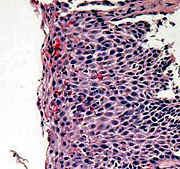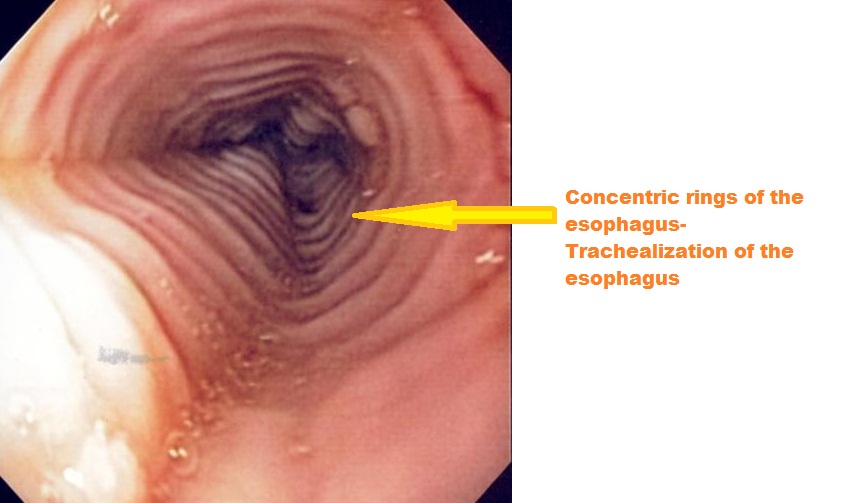Eosinophilic esophagitis other diagnostic studies
|
Eosinophilic Esophagitis Microchapters |
|
Differentiating Eosinophilic Esophagitis from other Diseases |
|---|
|
Diagnosis |
|
Treatment |
|
Case Studies |
|
Eosinophilic esophagitis other diagnostic studies On the Web |
|
American Roentgen Ray Society Images of Eosinophilic esophagitis other diagnostic studies |
|
Eosinophilic esophagitis other diagnostic studies in the news |
|
Risk calculators and risk factors for Eosinophilic esophagitis other diagnostic studies |
Editor-In-Chief: C. Michael Gibson, M.S., M.D. [1] Associate Editor(s)-in-Chief: Ajay Gade MD[2]]
Overview
Endoscopic abnormalities in patients with EoE are as follows fixed esophageal ring which is corrugated, white exudates or plaques, longitudinal furrows, mucosal pallor, diffuse esophageal narrowing, mucosal fragility leading to esophageal lacerations during the endoscopy.
Other Diagnostic Studies
Endoscopy
- Mucosal biopsies of the esophagus should be obtained in all patients in whom EoE is a clinical possibility regardless of the endoscopic appearance.
- Endoscopic abnormalities in patients with EoE are as follows:[1][2][3][4][5]
- Fixed esophageal ring which is corrugated
- White exudate
- Longitudinal furrows
- Mucosal pallor
- Diffuse esophageal narrowing
- Mucosal fragility leading to esophageal lacerations during the endoscopy
- However, because these endoscopic features have been described in other esophageal disorders, none can be considered pathognomonic for EoE.
-
Endoscopy of the esophagus: Eosinophilic esophagitis
Source: Wikimedia
Biopsy
- Characteristic features are as follows:
- criteria is: > 20 eosinophils/0.24 mm2.
- Papillae are elongated
- Papillae reach into the top 1/3 of the epithelial layer
- Basal cell hyperplasia; > 3 cells thick or >15% of epithelial thickness

References
- ↑ 44</a>)">"Table 3: Proposed classification and grading system for the endoscopic assessment of the esophageal features of eosinophilic esophagitis (<a id=ref-link-section-1 title="" href=/articles/#ref44>44</a>)".
- ↑ "Vertical lines in distal esophageal mucosa (VLEM): a true endoscopic manifestation of esophagitis in children? - PubMed - NCBI".
- ↑ "Fragility of the esophageal mucosa: a pathognomonic endoscopic sign of primary eosinophilic esophagitis? - PubMed - NCBI".
- ↑ "Eosinophilic esophagitis: red on microscopy, white on endoscopy. - PubMed - NCBI".
- ↑ "The prevalence and diagnostic utility of endoscopic features of eosinophilic esophagitis: a meta-analysis. - PubMed - NCBI".
